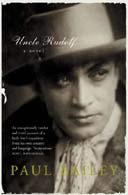
Uncle Rudolf
by Paul Bailey
Fourth Estate £12.99, pp184
Approaching senility and fearing his imminent lapse into wordlessness an old man sits down to write his memoirs. In a tense, 200-page stream of consciousness - a slow, controlled bloodletting - Andrew Peters, born Andrei Petrescu, a Romanian Jew, in 1930 - breaks 70 years of silence.
His story begins in 1937, when seven-year-old Andrei is sent by his father to London for what he is promised is a short holiday with his Uncle Rudolf, an internationally famous operetta star. Andrei never sees his parents again; never speaks their language and only returns to his country a lifetime later to see it sinking once more beneath the weight of fascism.
From the moment he is released from his uncle's embrace on the platform at Victoria station, the young Andrei finds himself transformed into Andrew; a permanent exile, forbidden to speak the language of his 'beastly' country and discouraged from asking after his parents who have 'gone into hiding'.
Brought up in the lap of luxury by his flamboyant uncle, Andrew metamorphoses with apparent success from a scared, poverty-stricken east European refugee to a wealthy, handsome Englishman, who weds a daughter of the shires. Inside the young, English gentleman however, the stunted, amputated Andrei festers and in the night, Andrei's ghost creeps back into him in bleak dreams, howling at the retreating backs of his parents in the forbidden language, begging them to turn round and come back to him.
Uncle Rudolf is a desperately sad tale; a haunting narrative by a haunted man whose inability to fuse the fragments of his childhood condemns him to an unanchored existence, floating between the old world - and words - and the new.
As the narrative progresses, it becomes clear that Andrew's painstaking efforts to illuminate his life is only bringing down the shadows. Unable to bear the pain of confronting his past in a chronological or sequential way, Andrew uses his memoir to orbit his tragedy, darting in and out to peel off layer after layer of memory until the full horror of his history is laid bare.
This is not to say the book has no humour: Uncle Rudolf is a character of irresistible bravura and charm with matinée-idol looks, who is obliged at one point to sift through a postbag of women's underwear, sent by fans unable to contain their excitement after a particular operetta has called on him to expose a shin on stage.
But beneath the bravura Uncle Rudolf is as tormented and guilt-ridden as his nephew; having severed himself from his homeland with the same brutal determination he exercised with his nephew, he then sealed his fate in a Faustian exchange, trading his true destiny as a lyric tenor of critical renown for the gaudy glamour of the operetta stage.
Uncle Rudolf is a poised and elegant tale of how a life can be imprisoned in the darkness of the past. As Andrew's shadows drop down to meet him, his pen finally begins to slow. He has talked himself out of life, out of the light and into the everlasting silence he feared from the start.

